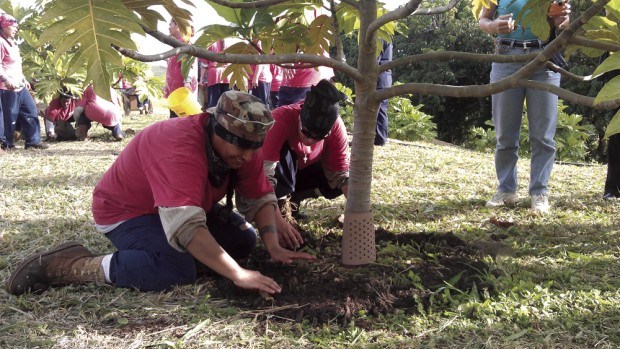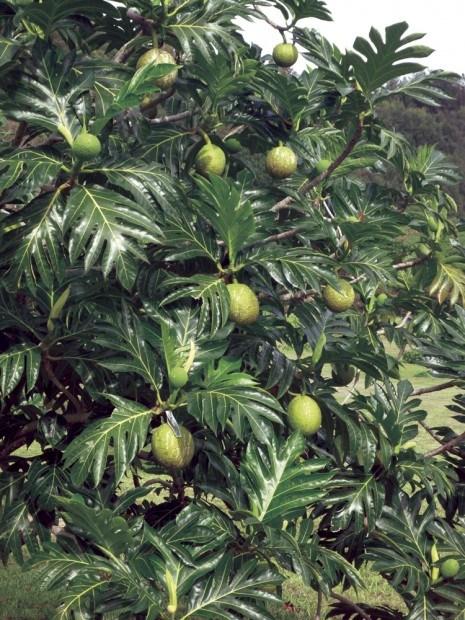The Women’s Community Correctional Center in O‘ahu has succeeded with an inmate breadfruit tree (‘Ulu) project with roots at the Breadfruit Institute in Kalaheo. The project was made possible through the Garden Club of Honolulu and the Breadfruit Institute at
The Women’s Community Correctional Center in O‘ahu has succeeded with an inmate breadfruit tree (‘Ulu) project with roots at the Breadfruit Institute in Kalaheo.
The project was made possible through the Garden Club of Honolulu and the Breadfruit Institute at the National Tropical Botanical Garden, located in Kalaheo. The partnerships expand much further, Institute Director Diane Ragone said.
The institute is a botanical collection of living trees with a laboratory for scientists and specialty volunteers. The adjacent McBryde Garden in the Lawa‘i Valley contains 45 breadfruit trees and a micro-propagation laboratory.
The prison’s trees originated in Kalaheo but they are cloned shoots that come from private laboratories in California, Columbia and Germany. The partnership with teams of technicians and resources abroad make it possible to fulfill the mission.
“We don’t propagate or ship them,” Ragone said. “We have research partners that harvest the buds for tissue cultures using methods in labs that revolutionized breadfruit propagation.”
The Breadfruit Institute would have difficulty shipping trees across borders, Ragone said. Cloning shoots is the only way to propagate the seedless varieties in many instances. The institute sterilizes and incubates them until transplanting to potting soil.
For nearly a decade, private propagation companies and strategic micro-propagation labs, including the University of British Columbia in Okanogan, have sent clones directly to project sites in Haiti, Jamaica, Honduras, Nicaragua, Ghana, and Nigeria. Partners specialize in techniques and research.
“It is a truly international endeavor,” Ragone said.
The commercial partner weaned the shoots and provided 10 plants to the Garden Club of Honolulu, which partnered with the Hawai‘i Department of Public Safety in its experiment to raise cloned ‘ulu trees at the women’s prison starting in September 2008.
The inmates already take horticulture classes to learn how to care for vegetable gardens, and the warden was interested in growing more food on the property. Ragone taught the inmates about ‘‘ulu and how to care for them from shoots to potted plants and in the ground.
Ragone said horticulture is a natural healing experience, and the inmates get a sense of empowerment and self-worth by learning skills that transfer to the real word and about opportunities that they didn’t have before.
“A lot of women come from families with gardens,” she said. “They grew food, but they had no horticulture knowledge and just basic information.”
The plants did so well that the inmates were going to plant them within four months. However they kept them potted until the 2009 Na Pua al‘l Flower Show at the Honolulu Academy of Arts that April. The inmate education exhibit won a national award from the Garden Club of America.
The trees are now yielding fruit from healthy trees. A work group of 14 inmates tends to the grove, with members of the Garden Club of Honolulu and Lani-Kailua Outdoor Circle making regular visits.
“The original 10 trees arrived measuring about six inches high,” Mark Patterson, warden of the women’s prison, said in a news release. “Today, the trees are seven feet tall and are beginning to bear their first fruit.”
The Breadfruit Institute also provides education programs and support.
“It is a real community-supported project, which is nice,” Ragone said. “I would love to see more projects like that throughout the state.”
For centuries, Pacific Island people have dried and preserved ‘ulu as a sour dough or processed it to make cabbage, kimchi or sauerkraut preserves.
”‘Ulu is perishable and gluten-free, and the institute is interested in widening its use as a supplement to wheat flour. ‘Ulu is valuable to tropical countries where it can grow easily,” Ragone said.
The varieties that are high in nutrients are most desired to address global micro-nutrient deficiency problems in naturally occurring ways. Ragone said one example is ‘ulu containing carotenoids, the plant-based precursors that form Vitamin A.
“According to Breadfruit Institute findings, every four seconds someone dies from hunger,” states Jean Abbott, a representative of the Garden Club of Honolulu. “More than 80 percent of the world’s hungry live in tropical and sub-tropical regions like Hawai‘i.”
The institute’s research is addressing food security around the world. Until this past decade, not much was known about ‘ulu varieties with regard to nutritional analysis, seasonal changes, fruit varieties and other factors.
Pacific Islanders have a real connection to ‘ulu since the era when it and a few foods could be relied on for survival. ‘Ulu is a staple that was roasted on rocks and made into poi, and as trees they provide canopy and soil cover.
Ma’afala ‘ulu offers 20 varieties that are widely present on seashores and inland islands of Polynesia and Hawai‘i. The different tastes and textures and ways to produce and distribute the plants demonstrate the untapped potential of the project.
Since the 1970s the institute’s Kaua‘i headquarters and Maui location have acquired the world’s largest collection of breadfruit varieties as a conservation resource. Many were disappearing.
“The goal was conservation and what should and could we do with this collection,” Ragone said.
The transfer of shoots must work within international policies and regulations about distributing plant material. The Institute also abides by cultural, indigenous and intellectual rights of the communities where the tree varieties originated, Ragone said.
The fees support agro-forestry, diversified agriculture and income generation.
“They agree to sell and distribute the plant variety, and we share revenues with them,” Ragone said. “There is a small plant fee, and we share it 50-50 and give it back to them to support agricultural training and programs.”
Ragone and an assistant are the only Kaua‘i staff. The collection manager and curator work at the larger collection maintained at Kahanu Garden on Maui.
The website for the Breadfruit Institute and McBride garden is www.breadfruit.org.



